- Home
- Kim Newman
Bad Dreams Page 3
Bad Dreams Read online
Page 3
That summer, Judi had realised that being clever was not getting her what she wanted out of life, and so she had decided to be stupid instead. She had stolen money from Cam's wallet and bought a Greyhound ticket to New York. In the city, it had not taken her long to find 42nd Street. On 42nd Street, it had taken her an absurdly, and probably mercifully, short time to find the undercover vice cop.
Father, the Great Man, had shrugged into a fit of inertia when the NYPD called, and so Anne had had to deal with it. Cameron Nielson Sr came up with the bail, his agent kept it out of the papers, and Anne went to town to pull her little sister out of the pussy posse's holding cells.
The next time, Judi had used her one telephone call to get in touch with a stringer for a paper so yellow that a dog could piss on it without making a difference. He had to be told who Cameron Nielson was, but he came up with the headlines anyway. NOBEL PRIZE-WINNER'S DOPER DAUGHTER IN B'WAY BUST. BAR-B-Q MAN'S GIRL IN SEX FOR DRUGS RACKET. Shit, that had been bad for all of them.
Anne thought again about The Call. Father could not talk any more. He had not written anything much since the late '60s. But he had been the only Nobel laureate ever to write for Rock Hudson and Doris Day, and then have his script redone by a kid fresh from two episodes of The Mod Squad and some quickies for Laugh-In. Anne thought that humiliation had done more to Cameron Nielson than any of Judi's exploits. More even than Hugh Farnham and his Committee. His only substantial work in the last ten years was The Rat Jacket, an intensely personal one-acter about an informer committing suicide. Widely interpreted as autobiographical, the piece - Anne suspected - would eventually be seen as one of his most important. There was talk of Robert Altman doing it as a television play with Harry Dean Stanton.
'Miss Nielson,' said Hollis, not unkindly, 'we're ready for you now.'
The policeman escorted her to the lift. He took a gentle hold of her upper arm and steered her. She was too drained to be annoyed by the imposition. The lift was large enough to accommodate several six-foot stretchers, and smelled like a dentist's office.
'We've contacted your brother. He was at the Grafton, like you said.'
'That's where he usually stays when he's in London.'
'Cameron Nielson? That's a famous name.' He was trying to make conversation, keep her mind busy. 'Any relation?'
'We're his children. It's Cameron Nielson Junior.'
'On the Graveyard Shift at Sam's Bar-B-Q and Grill. It's a 20th century classic.'
'That's what they say.'
'I saw it at the National when Albert Finney did the revival. With Donald Pleasence as Sam. Of course, I've seen the film…'
'Elia Kazan directed that.'
'… with Marlon Brando, Lee J. Cobb, Therese Colt and Eli Wallach and… who was the girl? The English actress?'
'Victoria Page. My mother. And Judi's. Not Cam's. That was another actress, a woman who divorced Dad in the fifties.'
They were there.
It was not like morgues in the movies. They did not have walls with long drawers. The bodies were on gurneys like elongated tea trolleys, with green sheets over them. The air conditioning was breathing low, cooling the place even in December. The place could as easily have been a school kitchen.
Movie morgues were always antiseptic, as clean and dignified as chapels. This was dirty. The waste bins overflowed with plastic cups and used paper towels. Someone had left an oily car battery recharging on a wash stand, and the only attendant was a kid with an unstarched mohican. He wore a Cramps T-shirt under his soiled hospital whites and he was reading the Arts pages of The Independent.
'Of course,' said Hollis, 'we've already identified her from fingerprints…'
'Yes, this is just a formality, but it has to be done. Right? You have forms to fill in before you can forget her.'
She was immediately sorry for snapping at him. After all, he was not P.C. Erskine. Hollis continued without taking notice. He must be used to dealing with irrational people.
'You knew that your sister had a criminal record?'
'Oh yes.' Here and in New York. Possession, soliciting, resisting arrest, carrying a concealed weapon, whatever. Judi's Interpol file was probably more substantial than anything Anne had written.
Hollis lifted the sheet himself.
There had been a mistake. It was not Judi.
This woman was old. All the substance beneath her mottled skin had drained away. She looked like a life-size shrunken head. The hair was dyed a blotchy black, but the roots were the white-yellow colour of drought-killed grass.
'It's a mistake,' said Anne, disorientated. 'It's not her. She was…'
'Twenty-five. We know.'
'But…'
'Look again.'
The eyes were open, rolled up into the skull, whites red-veined. The dead old woman's mouth was shrunken, but still firm. She had all her teeth.
Not wanting to, Anne touched the face. There was a spot on the upper lip, where Bogart had a scar, where Judi had a mole.
'It can't be. How…?' She looked at Hollis, and answered her own question. 'Drugs. Heroin?'
Hollis gently eased the left arm out from under the sheet. He ran a finger over the extensive abrasions. Amid the bruises, Anne could see fresh and ancient pinpricks. And there was Judi's crescent scar over the inoculation marks. A childhood scrape with an electric lamp.
Anne wanted to cry, to break down, to give up.
Hollis was talking, almost lecturing.
'She was an addict. We know that. Recently, there have been some quantum leaps in the drugs industry. They don't need to import as much opium-derived heroin as they used to. The stuff can be synthesised in laboratories. Designer drugs, they're called. From California, originally. The stuff is cheaper, purer, more debilitating. Strictly, it's not even illegal yet. I've seen senile teenagers. It affects the metabolic rate. The processes that make you grow old… I don't really understand this… they get speeded up…'
Poor Judi. Wasted. Her whole life literally used up. Anne looked at the old woman's face and saw the child her sister had been. Judi had not died easily.
Hollis covered Judi again, tucking her in.
'Did she do this to herself?' Anne asked.
Hollis looked at the floor, not quite shrugging.
Anne did not say any more. She was too good a judge of her own character. She knew what she wanted. It was the same when their mother had left, and when the novel had not worked out, when she had first heard of Charlie Aziz, and when father had wound up mute in a chair. For her, it was only natural.
She wanted someone to blame.
FOUR
… EVEN THE Kind dreamed. But with the passing of so many years, the old man had outlived his imagination. All his mind had left was the almost unbearable weight of memory. There was so much he could no longer consciously recollect. Yet all of it existed, untapped by his waking self, in his night thoughts…
By the standards of centuries he would live to see, it had hardly been a battle at all. A routine patrol of six or seven horsemen with maybe two lances between them had come upon the enemy encamped in a shallow valley and, against his orders, engaged them. The din had carried in the strong winds, and his own camp had been roused to the combat. His hand thus forced, he had committed his men to the skirmish. It had turned into a minor massacre.
Taking both armies into account, there were perhaps one hundred dead. But he was well pleased. The English captain had been taken, and he had spent a long, rewarding afternoon with him. The man had been a genuine soldier, not some royal cousin assigned a command to keep him out of treason and plotting at home. He was much more resilient than the children who were his frequent guests between wars, but, in the end, he had yielded as completely as the scrawniest peasant brat.
He was satisfied, glutted, complete. Beneath his helmet, the tangle of his hair, grey-streaked at dawn, was a match now for the purest sable. His lieutenants no longer remarked upon the changes in him. By now, they were used to his cycles and s
imply put his occasional youthful appearance down to sorcery. A few of them were given to boasting about their master's skill in the Black Arts, and that could be useful from time to time. Poor Sieur Barbe-Bleue, meticulously obsessive as ever, was even trying through atrocity and alchemy to ape him, searching in the ruined and abused flesh of small boys for an elusive immortality. But some of his other officers, an unfortunate number who would soon learn better, had almost forgotten to fear him. For them, the English captain should have been saved for a ransom, not wasted on pleasure.
He had his ragged cloth-of-gold pitched on the bloody grass, about where the fighting had been most concentrated. He looked forward to stretching out on the insanguinated ground and luxuriating in the residues as others would in a heated and perfumed bath.
After the Englishman was exhausted, and consigned to the bonfires with his followers and the dead horses, he paid a visit to the girl.
She was squatting between the fires, her face still streaked with blood, her hands clasped in prayer. Sometimes he wondered what she said to her saints. Did she apologise for the extra load of souls that were lining up outside the Gates of Heaven as a result of her conversations with dead divines?
He knelt before her, and took her young head in his hands. His fingers slid into her cropped, coarse hair. He picked out a hard-shelled parasite and popped it between thumb and forefinger.
He, the Monster, kissed her, the Saint.
That year, he favoured little boys. But his congress with the girl was different. Her skin was permanently marked with the weave of chain mail. During the physical act of love, she called him 'father' several times. Whether she meant her father in the village, a father at the church, or the Father in Heaven, he could not say.
The wind tore at the already tattered walls of the tent, detaching wisps of golden thread that floated over the camp. A detail was stripping the dead of their armour, and piling it up. The fires burned fiercely, roasting and consuming carcasses with much crackling and hissing. The soldiers sang, words about intercourse with goats set to sacred tunes.
Every so often, there was a gurgling cry. He had ordered the whores to comb the battlefield, cutting the throats of the wounded, no matter whose colours they wore.
Close to his already dwindling body, the girl slept, doubtless dreaming of the young king and the angelic voices that whispered inside her skull. He touched his head gently to hers and sadly tasted the emptiness within. Briefly, he thought there was something, but it was just a memory of the unending winds that forced this girl, and all like her, to and fro without regard.
Strangely, he did not feed off her.
FIVE
THERE WERE Monsters, Anne knew. It was a secret she shared with Judi. Their father had met a Monster, and lost, before they were born. Anne knew all about it. She had seen the kinescopes. She knew the face of the Monster, and that their family bogeyman had once had a name, Hugh Farnham, but that was the least of it. He went on forever, revealed only by a tone of voice, a strident attitude, an indestructible set of mind, a few whistled bars of an old film theme tune.
'You have to stop thinking in absolutes,' her journalism tutor had told her. 'Life isn't a movie, with good guys and bad guys, heroes and monsters.'
She knew there were no heroes, but she could see the Monsters everywhere. Hugh Farnham was long gone, but there were others. P.C. Barry 'The Batterer' Erskine, the hate-consumed Ulster clergyman, the calf-faced girl on Page Three of The Sun, the presidential advisor, the Soviet chess grand master, the old hippie rock musician, the Middle Eastern mullah, the television quiz show m.c., the political columnist in the downmarket Sunday paper, the science fiction writer hawking the fourth volume of his trilogy, and a thousand other, lesser, demons.
'Annie, did you know they had your old man on film in the archives?' Pat, her college roommate, had asked. 'They've got his appearance before McCarthy.'
Strictly speaking, it had not been McCarthy. He had gone down with the astonishing hearings in 1954, when he had been crucified in court for daring to graduate from the easy pickings of Hollywood to try to detect traces of Communist infiltration in President Eisenower's Alma Mater, the army.
Father had been up before Hugh Farnham three years later, at the tail-end of the blacklist.
She had resisted the temptation for weeks, but finally she gave in. She had to scratch the itch, even if it turned into an open sore. Frankly pleading her special interest to the head of the Modern American History department, she was given access. She had to thread the projector herself, and confront the Monster in a drafty basement screening room with uncomfortable seats and a strict no smoking rule. In those days, she had been a smoker. In those days, like everyone else, she had even played around with drugs.
The kinescopes were not properly catalogued, so she had to watch until she found what she was looking for. Her father did not show up until the fourteenth of twenty half-hour reels, covering nearly ten years of different sessions, but she was still fascinated. It was Hugh Farnham, the Monster. Joe McCarthy had got all the contemporary press coverage and had an -ism named after him, and Richard Nixon had used the hearings as a springboard into grown-up politics. Even Roy Cohn, the legal eminence grise who had died of AIDS a few years back, was comparatively well-remembered. But Farnham was Something Else. The others were in it for patriotism, self-advancement, megalomania, paranoid self-justification and financial gain. Half-way through his delicate dissection of Martin Ritt, Anne realised with a dizzying rush of vertigo that Farnham tormented people because it was his idea of fun. It met a need in him he could not slake any other way.
His eyes were nothing in particular in black and white, certainly not burning coals of melodramatic malevolence. And his voice was like a Broadway actor's in a Shakespeare play, unaccented but more British than American. He had always been something of a mystery man; in theory, Anne knew where he had come from and what he had done before the hearings, but, watching his smile, she found she had forgotten the precise details. His face was unforgettable, as if the skin of a pale cobra had been stretched over the bone structure of Montgomery Clift.
She wondered what had happened to him. Perhaps he had been badly burned in the War, and had had to be patched together by expensive teams of plastic surgeons intent on performing miracles. In the shadows of the courtroom, he looked older than Dracula, but, when he was firing questions at unfriendly witnesses like Kim Hunter or Zero Mostel, he was younger, more virile, more in control, than a matinee idol on a triumphant opening night.
'Are you now,' Farnham kept asking, always with the biting pause in the same place, 'or have you ever been, a member of the Communist Party?'
Unlike McCarthy, Farnham did not pronounce it 'commonest party'. The only thing her father had ever said about the Monster was that, at the height of the televised hearings, Hugh Farnham received more fan mail from women than Elvis.
Thirty-five years later, it was all clear. McCarthy was stupid - a blustering clown. It was incredible that he had got away with it for so long. The one indelible image of the period was of McCarthy whispering in Roy Cohn's ear like a school bully suddenly desperate for advice, and the lawyer looking shocked and shattered as he realises just how doomed his buffoon boss is among all the smart lawyers. Nixon was a glowering, unshaven crook, a sweaty Boris Karloff in Arsenic and Old Lace. Anne understood why he had been God's gift to the protest movement, an Establishment villain who always looked and acted like one. And the 'friendly' witnesses - Robert Taylor, Adolph Menjou, Therese Colt - embarrassed themselves and flushed lesser people down the toilet as they blurted out their hatred of anyone in Hollywood they thought might be communists even if they could not think of any actual proof of their left-leaning politics. But Congressman Hugh Farnham was John Wayne, Captain America, Parsifal and the young Jack Kennedy rolled into one.
Sweet Jesus, this man could have been president.
Waving a petition against the Committee signed by various Hollywood notables, Farnham even got
chilling laughs with one speech. 'I want to read you some of these names,' he began, in a mildly sardonic manner, a brow arched. 'One of the names is June Havoc. We found out from the Motion Picture Almanac that her real name is June Hovick. Another one is Danny Kaye, and we find his real name is David Daniel Kaminsky. Then we have the case of Mr John Garfield, we Julius Garfinkle. Eddie Cantor, known to his mother as Eddie Iskowitz. The famous Edward G. Robinson, a.k.a Emmanuel Goldenberg. A fellow who signs his autograph Melvyn Douglas, but who is really not a Douglas at all but a Hesselberg. A promising Broadway gent called Cameron Nielson whose birth certificate reads Comrade… pardon me, Conrad Nastase. There are others too numerous to mention. They are attacking this house for doing its duty to protect this country and save the American people from the horrible fate the communists have meted out to the unfortunate Christian people of Europe.'
When her father showed up, late in the day, she did not recognise him. It was a fluke that his hearing, which was officially an 'enquiry into the misuse of a United States passport' although the criminal charge hanging over him was actually Contempt of Congress, had been televised. By the time his name came up, everyone but the witchfmders had lost interest. It must have been a ratings-slow period. It was hard to connect the young man with the dark hair, quick grin and self-confident way with words to the person she had grown up around. All that was there were the horn-rimmed glasses and unearned Ivy League tie.
In the film, Cameron Nielson was confident that he could defeat the Monster. His daughter knew that he had been destroyed by it.
In 1957, the days of the blacklist were supposedly over, but her father was unemployable in Hollywood, his TV play The Crunch had been bounced without comment by all three networks, and his 'historical pageant' Cochise and Geronimo had closed after three weeks and two days on Broadway.

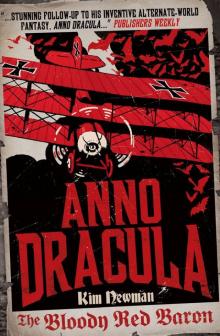 The Bloody Red Baron
The Bloody Red Baron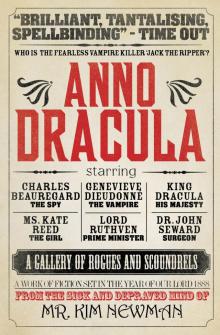 Anno Dracula
Anno Dracula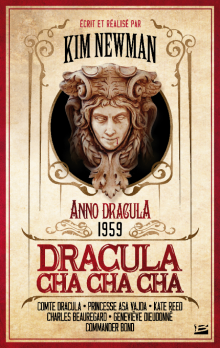 Dracula Cha Cha Cha
Dracula Cha Cha Cha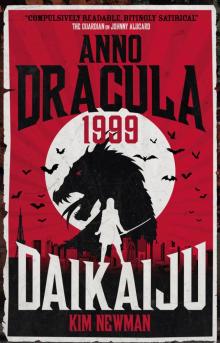 Anno Dracula 1999
Anno Dracula 1999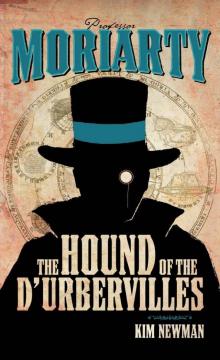 Moriarty: The Hound of the D'Urbervilles
Moriarty: The Hound of the D'Urbervilles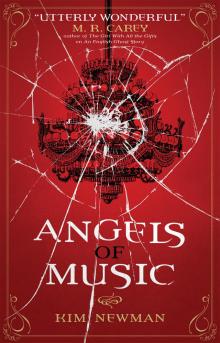 Angels of Music
Angels of Music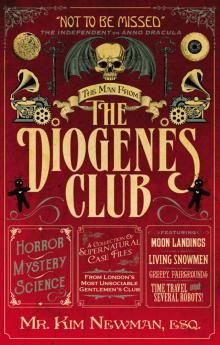 The Man From the Diogenes Club
The Man From the Diogenes Club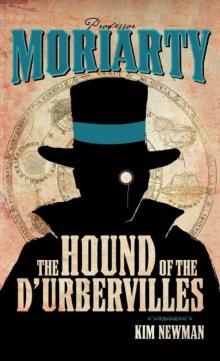 Professor Moriarty: The Hound Of The D’urbervilles
Professor Moriarty: The Hound Of The D’urbervilles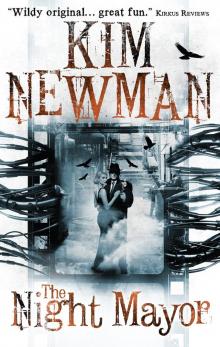 The Night Mayor
The Night Mayor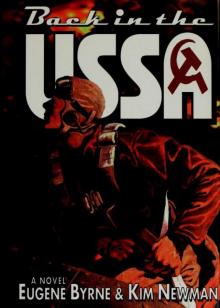 Back in the USSA
Back in the USSA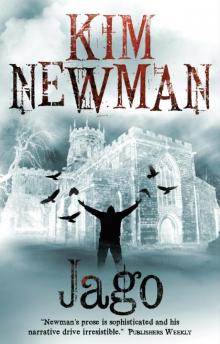 Jago
Jago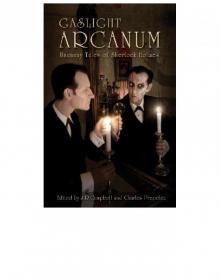 Gaslight Arcanum: Uncanny Tales of Sherlock Holmes
Gaslight Arcanum: Uncanny Tales of Sherlock Holmes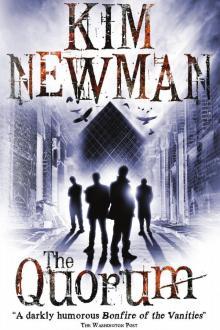 The Quorum
The Quorum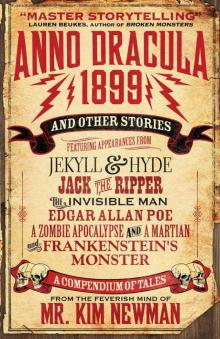 Anno Dracula 1899 and Other Stories
Anno Dracula 1899 and Other Stories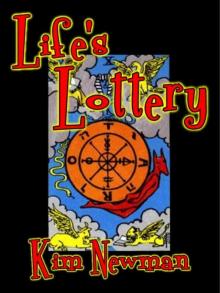 Life's Lottery
Life's Lottery The Secrets of Drearcliff Grange School
The Secrets of Drearcliff Grange School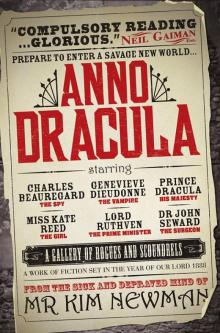 Anno Dracula ad-1
Anno Dracula ad-1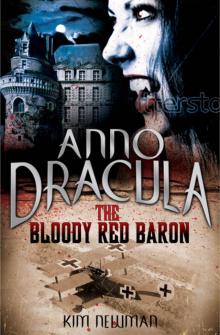 The Bloody Red Baron: 1918 ad-2
The Bloody Red Baron: 1918 ad-2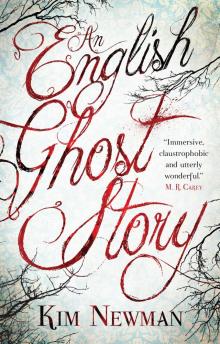 An English Ghost Story
An English Ghost Story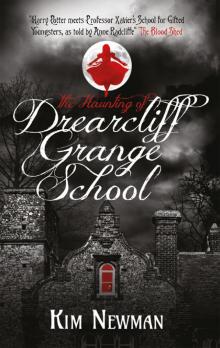 The Haunting of Drearcliff Grange School
The Haunting of Drearcliff Grange School The Other Side of Midnight
The Other Side of Midnight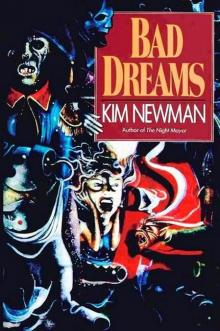 Bad Dreams
Bad Dreams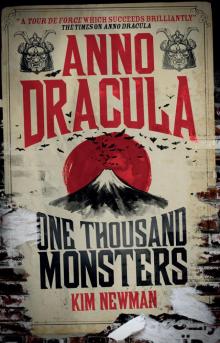 Anno Dracula--One Thousand Monsters
Anno Dracula--One Thousand Monsters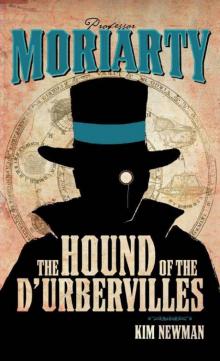 The Hound Of The D’urbervilles
The Hound Of The D’urbervilles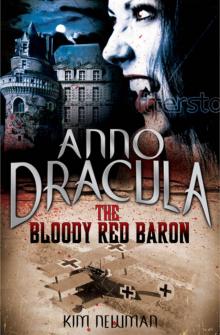 The Bloody Red Baron: Anno Dracula 1918
The Bloody Red Baron: Anno Dracula 1918